Unit 5 Memories Lesson 14 Grandpa's Memories 第1课时 课件(共43张PPT)+内嵌音频
文档属性
| 名称 | Unit 5 Memories Lesson 14 Grandpa's Memories 第1课时 课件(共43张PPT)+内嵌音频 |

|
|
| 格式 | zip | ||
| 文件大小 | 5.9MB | ||
| 资源类型 | 教案 | ||
| 版本资源 | 北师大版 | ||
| 科目 | 英语 | ||
| 更新时间 | 2020-06-20 14:22:35 | ||
图片预览

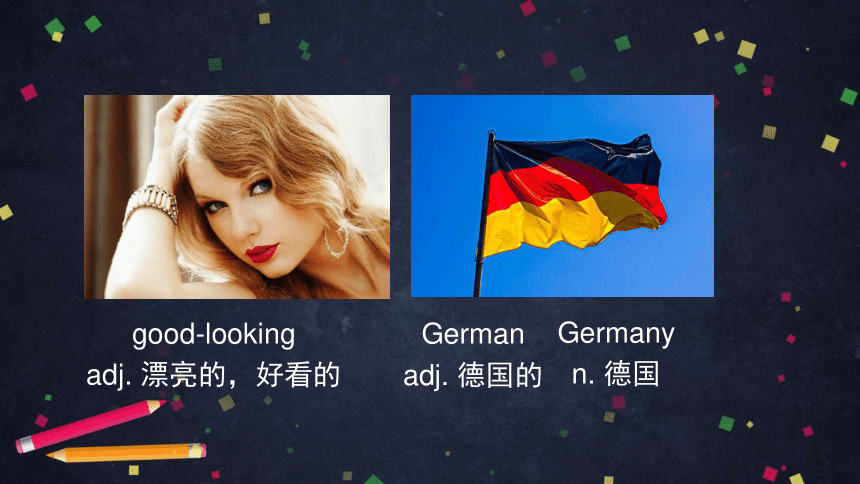

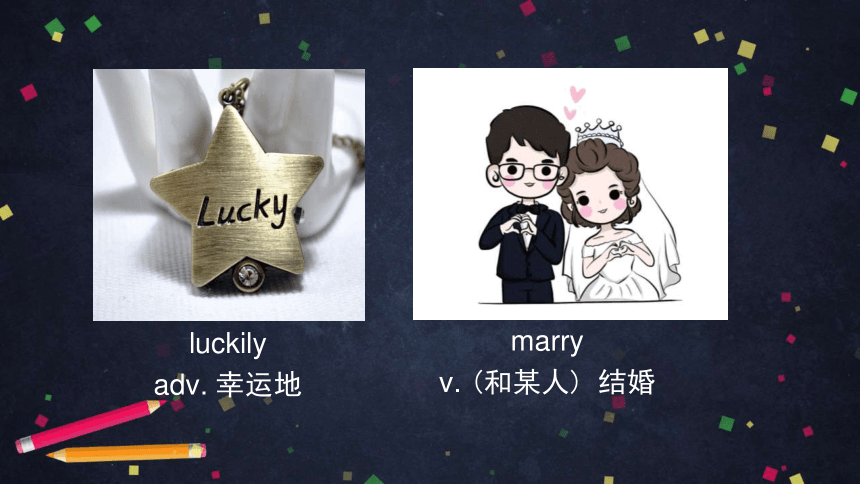
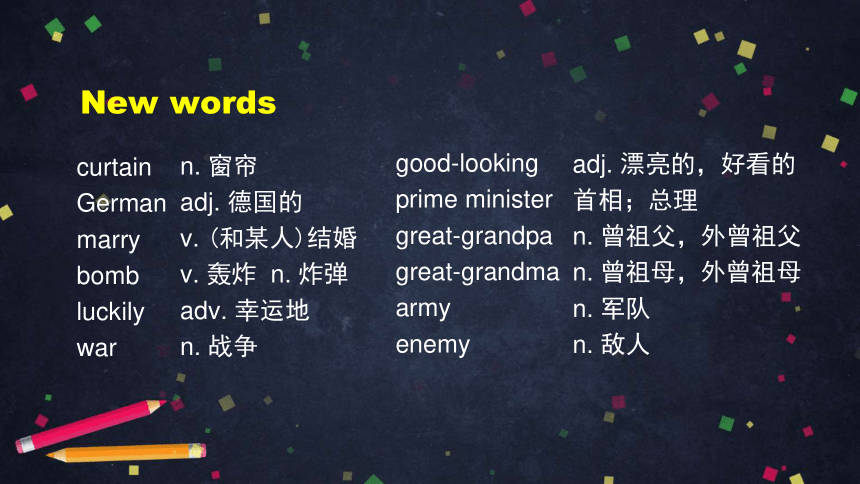
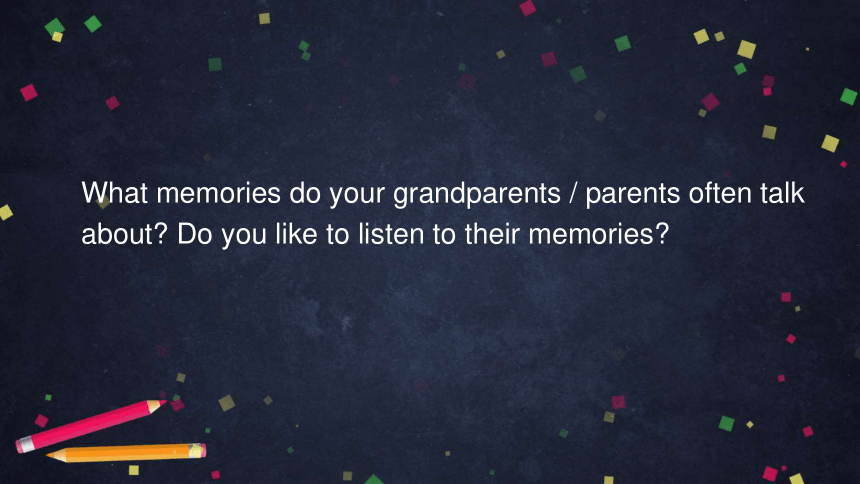
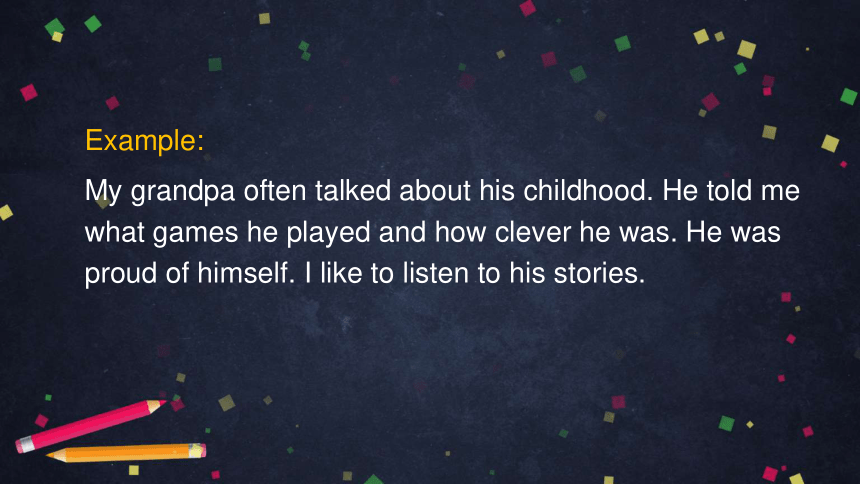
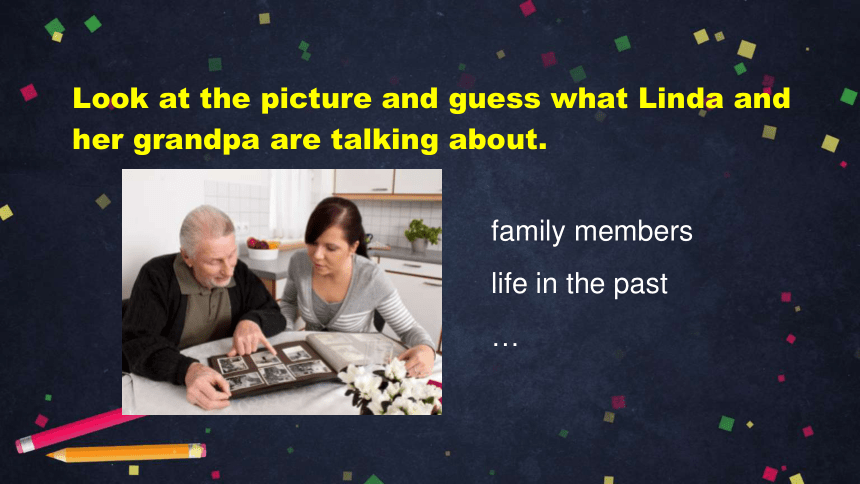
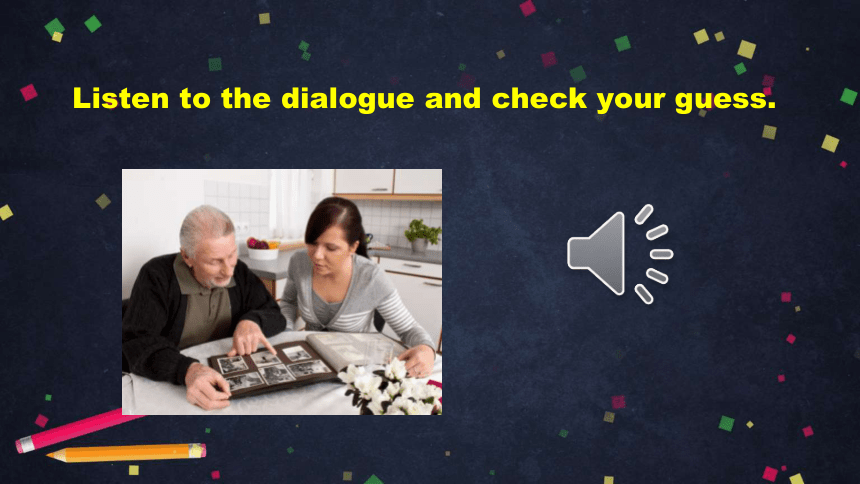
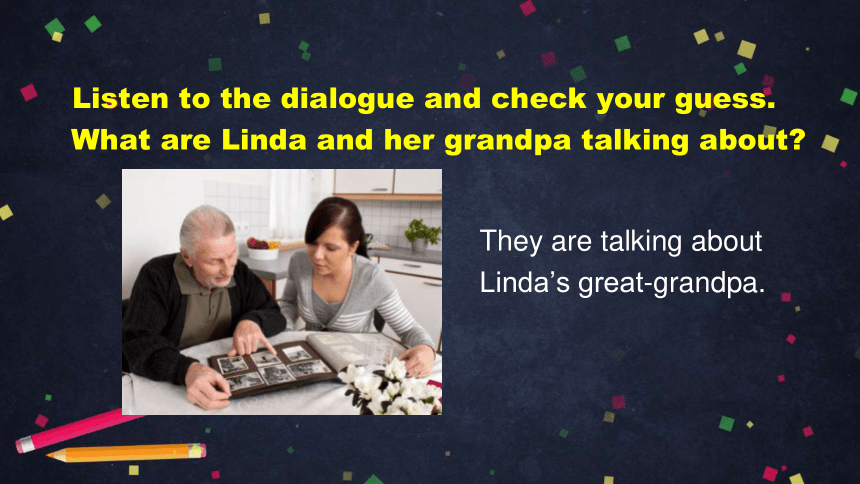
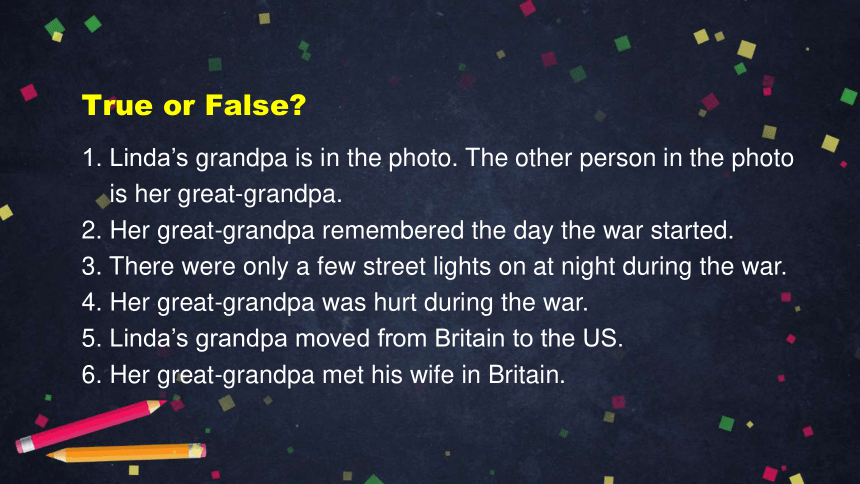
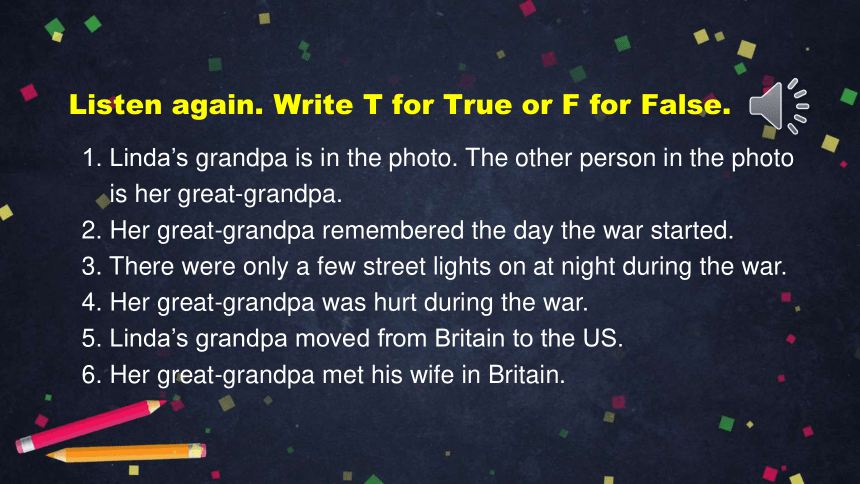
文档简介
(共43张PPT)
U5
Lesson
14
Grandpa’s
Memories
1
初二年级
英语
good-looking
adj.
漂亮的,好看的
German
adj.
德国的
Germany
n.
德国
curtain
n.
窗帘
bomb
n.
炸弹
v.
轰炸
luckily
adv.
幸运地
marry
v.
(和某人)
结婚
New
words
curtain
German
marry
bomb
luckily
war
good-looking
prime
minister
great-grandpa
great-grandma
army
enemy
n.
窗帘
adj.
德国的
v.
(和某人)结婚
v.
轰炸
n.
炸弹
adv.
幸运地
n.
战争
adj.
漂亮的,好看的
首相;总理
n.
曾祖父,外曾祖父
n.
曾祖母,外曾祖母
n.
军队
n.
敌人
What
memories
do
your
grandparents
/
parents
often
talk
about?
Do
you
like
to
listen
to
their
memories?
Example:
My
grandpa
often
talked
about
his
childhood.
He
told
me
what
games
he
played
and
how
clever
he
was.
He
was
proud
of
himself.
I
like
to
listen
to
his
stories.
Look
at
the
picture
and
guess
what
Linda
and
her
grandpa
are
talking
about.
family
members
life
in
the
past
…
Listen
to
the
dialogue
and
check
your
guess.
Listen
to
the
dialogue
and
check
your
guess.
What
are
Linda
and
her
grandpa
talking
about?
They
are
talking
about
Linda’s
great-grandpa.
True
or
False?
1.
Linda’s
grandpa
is
in
the
photo.
The
other
person
in
the
photo
is
her
great-grandpa.
2.
Her
great-grandpa
remembered
the
day
the
war
started.
3.
There
were
only
a
few
street
lights
on
at
night
during
the
war.
4.
Her
great-grandpa
was
hurt
during
the
war.
5.
Linda’s
grandpa
moved
from
Britain
to
the
US.
6.
Her
great-grandpa
met
his
wife
in
Britain.
Listen
again.
Write
T
for
True
or
F
for
False.
1.
Linda’s
grandpa
is
in
the
photo.
The
other
person
in
the
photo
is
her
great-grandpa.
2.
Her
great-grandpa
remembered
the
day
the
war
started.
3.
There
were
only
a
few
street
lights
on
at
night
during
the
war.
4.
Her
great-grandpa
was
hurt
during
the
war.
5.
Linda’s
grandpa
moved
from
Britain
to
the
US.
6.
Her
great-grandpa
met
his
wife
in
Britain.
1.
Linda’s
grandpa
is
in
the
photo.
The
other
person
in
the
photo
is
her
great-grandpa.
T
Listen
again.
Write
T
for
True
or
F
for
False.
2.
Her
great-grandpa
remembered
the
day
the
war
started.
T
Listen
again.
Write
T
for
True
or
F
for
False.
3.
There
were
only
a
few
street
lights
on
at
night
during
the
war.
F
Listen
again.
Write
T
for
True
or
F
for
False.
4.
Her
great-grandpa
was
hurt
during
the
war.
F
Listen
again.
Write
T
for
True
or
F
for
False.
5.
Linda’s
grandpa
moved
from
Britain
to
the
US.
F
Listen
again.
Write
T
for
True
or
F
for
False.
6.
Her
great-grandpa
met
his
wife
in
Britain.
F
Listen
again.
Write
T
for
True
or
F
for
False.
True
or
False?
1.
Linda’s
grandpa
is
in
the
photo.
The
other
person
in
the
photo
is
her
great-grandpa.
2.
Her
great-grandpa
remembered
the
day
the
war
started.
3.
There
were
only
a
few
street
lights
on
at
night
during
the
war.
4.
Her
great-grandpa
was
hurt
during
the
war.
5.
Linda’s
grandpa
moved
from
Britain
to
the
US.
6.
Her
great-grandpa
met
his
wife
in
Britain.
F
F
F
F
T
T
Read
the
dialogue
aloud.
(P131)
How
does
Linda
feel
when
she
hears
her
great-grandpa’s
stories?
Discussion:
surprised,
excited
…
How
does
she
express
her
feelings?
Read
the
dialogue
and
find
out:
surprised
excited
Read
the
dialogue
and
find
out:
sad
disappointed
Read
the
dialogue
and
find
out:
Wow,
you
look
so
young!
Is
it?
/
He
did?
That’s
good!
That
was
lucky!
Oh
no!
That
would
be
scary.
That’s
so
sad.
Expressing
surprise
or
excitement
Expressing
disappointment
or
sadness
Expressions
Functions
Key
Expressions:
Expressing
surprise
or
excitement
Wow,
you
look
so
young!
Is
it?
/
He
did?
That’s
good!
That
was
lucky!
Function
感叹与失望
Key
Expressions:
Expressing
disappointment
or
sadness
Oh
no!
That
would
be
scary.
That’s
so
sad.
Function
感叹与失望
Choose
the
best
expression
to
complete
the
conversations.
1.
A:
I
won
a
prize
at
the
school
Sports
Day,
Mum!
B:
Oh
no!
/
That’s
great!
2.
A:
I
lost
my
wallet
but
someone
found
it
on
the
bus
and
brought
it
to
the
school.
B:
That
was
lucky.
/
That’s
great.
Choose
the
best
expression
to
complete
the
conversations.
3.
A:
We
lost
the
football
match
5-0.
B:
Oh
good!
/
That’s
too
bad.
4.
A:
I
came
first
in
all
my
exams
this
year.
B:
That
was
lucky.
/
Wow!
5.
A:
I
fell
over
and
broke
my
leg.
B:
Oh
no!
/
Oh
good!
1.
A:
I
won
a
prize
at
the
school
Sports
Day,
Mum!
B:
That’s
great!
2.
A:
I
lost
my
wallet
but
someone
found
it
on
the
bus
and
brought
it
to
the
school.
B:
That
was
lucky.
Read
the
conversations.
3.
A:
We
lost
the
football
match
5-0.
B:
That’s
too
bad.
4.
A:
I
came
first
in
all
my
exams
this
year.
B:
Wow!
5.
A:
I
fell
over
and
broke
my
leg.
B:
Oh
no!
Read
the
conversations.
You
lost
something
and
found
it
later.
You
won
a
prize
or
competition.
You
had
an
exciting
trip
or
holiday.
You
were
sad
or
unhappy.
Pair
Work
Tell
your
partner
about
the
following
situations.
Speaking
A:
I
lost
my
pet
Stone
a
year
ago.
I
was
really
sad.
B:
Oh,
that’s
too
bad.
A:
My
neighbour
found
him
and
brought
him
back
home
a
week
later.
B:
That
was
lucky.
Speaking
Example
Pair
Work
Tell
your
partner
about
the
following
situations.
Listen
and
underline
the
correct
meaning.
Pronunciation:
Tone
of
voice
and
meaning
“That’s
great!”
I
(think
/
don’t
think)
it’s
great.
“That’s
too
bad.”
I
(think
/
don’t
think)
that’s
bad.
Listen
and
underline
the
correct
meaning.
Pronunciation:
Tone
of
voice
and
meaning
1.
“That’s
great!”
I
(think
/
don’t
think)
it’s
great.
2.
“That’s
great!”
I
(think
/
don’t
think)
it’s
great.
Listen
and
underline
the
correct
meaning.
Pronunciation:
Tone
of
voice
and
meaning
3.
“That’s
too
bad.”
I
(think
/
don’t
think)
that’s
bad.
4.
“That’s
too
bad.”
I
(think
/
don’t
think)
that’s
bad.
Now
listen
and
repeat.
“That’s
great!”
“That’s
too
bad.”
Homework
1.
Read
aloud
the
dialogue
on
Page
131.
2.
Choose
one
situation
from
the
speaking
exercise
and
write
down
a
conversation.
Thank
you!
U5
Lesson
14
Grandpa’s
Memories
1
初二年级
英语
good-looking
adj.
漂亮的,好看的
German
adj.
德国的
Germany
n.
德国
curtain
n.
窗帘
bomb
n.
炸弹
v.
轰炸
luckily
adv.
幸运地
marry
v.
(和某人)
结婚
New
words
curtain
German
marry
bomb
luckily
war
good-looking
prime
minister
great-grandpa
great-grandma
army
enemy
n.
窗帘
adj.
德国的
v.
(和某人)结婚
v.
轰炸
n.
炸弹
adv.
幸运地
n.
战争
adj.
漂亮的,好看的
首相;总理
n.
曾祖父,外曾祖父
n.
曾祖母,外曾祖母
n.
军队
n.
敌人
What
memories
do
your
grandparents
/
parents
often
talk
about?
Do
you
like
to
listen
to
their
memories?
Example:
My
grandpa
often
talked
about
his
childhood.
He
told
me
what
games
he
played
and
how
clever
he
was.
He
was
proud
of
himself.
I
like
to
listen
to
his
stories.
Look
at
the
picture
and
guess
what
Linda
and
her
grandpa
are
talking
about.
family
members
life
in
the
past
…
Listen
to
the
dialogue
and
check
your
guess.
Listen
to
the
dialogue
and
check
your
guess.
What
are
Linda
and
her
grandpa
talking
about?
They
are
talking
about
Linda’s
great-grandpa.
True
or
False?
1.
Linda’s
grandpa
is
in
the
photo.
The
other
person
in
the
photo
is
her
great-grandpa.
2.
Her
great-grandpa
remembered
the
day
the
war
started.
3.
There
were
only
a
few
street
lights
on
at
night
during
the
war.
4.
Her
great-grandpa
was
hurt
during
the
war.
5.
Linda’s
grandpa
moved
from
Britain
to
the
US.
6.
Her
great-grandpa
met
his
wife
in
Britain.
Listen
again.
Write
T
for
True
or
F
for
False.
1.
Linda’s
grandpa
is
in
the
photo.
The
other
person
in
the
photo
is
her
great-grandpa.
2.
Her
great-grandpa
remembered
the
day
the
war
started.
3.
There
were
only
a
few
street
lights
on
at
night
during
the
war.
4.
Her
great-grandpa
was
hurt
during
the
war.
5.
Linda’s
grandpa
moved
from
Britain
to
the
US.
6.
Her
great-grandpa
met
his
wife
in
Britain.
1.
Linda’s
grandpa
is
in
the
photo.
The
other
person
in
the
photo
is
her
great-grandpa.
T
Listen
again.
Write
T
for
True
or
F
for
False.
2.
Her
great-grandpa
remembered
the
day
the
war
started.
T
Listen
again.
Write
T
for
True
or
F
for
False.
3.
There
were
only
a
few
street
lights
on
at
night
during
the
war.
F
Listen
again.
Write
T
for
True
or
F
for
False.
4.
Her
great-grandpa
was
hurt
during
the
war.
F
Listen
again.
Write
T
for
True
or
F
for
False.
5.
Linda’s
grandpa
moved
from
Britain
to
the
US.
F
Listen
again.
Write
T
for
True
or
F
for
False.
6.
Her
great-grandpa
met
his
wife
in
Britain.
F
Listen
again.
Write
T
for
True
or
F
for
False.
True
or
False?
1.
Linda’s
grandpa
is
in
the
photo.
The
other
person
in
the
photo
is
her
great-grandpa.
2.
Her
great-grandpa
remembered
the
day
the
war
started.
3.
There
were
only
a
few
street
lights
on
at
night
during
the
war.
4.
Her
great-grandpa
was
hurt
during
the
war.
5.
Linda’s
grandpa
moved
from
Britain
to
the
US.
6.
Her
great-grandpa
met
his
wife
in
Britain.
F
F
F
F
T
T
Read
the
dialogue
aloud.
(P131)
How
does
Linda
feel
when
she
hears
her
great-grandpa’s
stories?
Discussion:
surprised,
excited
…
How
does
she
express
her
feelings?
Read
the
dialogue
and
find
out:
surprised
excited
Read
the
dialogue
and
find
out:
sad
disappointed
Read
the
dialogue
and
find
out:
Wow,
you
look
so
young!
Is
it?
/
He
did?
That’s
good!
That
was
lucky!
Oh
no!
That
would
be
scary.
That’s
so
sad.
Expressing
surprise
or
excitement
Expressing
disappointment
or
sadness
Expressions
Functions
Key
Expressions:
Expressing
surprise
or
excitement
Wow,
you
look
so
young!
Is
it?
/
He
did?
That’s
good!
That
was
lucky!
Function
感叹与失望
Key
Expressions:
Expressing
disappointment
or
sadness
Oh
no!
That
would
be
scary.
That’s
so
sad.
Function
感叹与失望
Choose
the
best
expression
to
complete
the
conversations.
1.
A:
I
won
a
prize
at
the
school
Sports
Day,
Mum!
B:
Oh
no!
/
That’s
great!
2.
A:
I
lost
my
wallet
but
someone
found
it
on
the
bus
and
brought
it
to
the
school.
B:
That
was
lucky.
/
That’s
great.
Choose
the
best
expression
to
complete
the
conversations.
3.
A:
We
lost
the
football
match
5-0.
B:
Oh
good!
/
That’s
too
bad.
4.
A:
I
came
first
in
all
my
exams
this
year.
B:
That
was
lucky.
/
Wow!
5.
A:
I
fell
over
and
broke
my
leg.
B:
Oh
no!
/
Oh
good!
1.
A:
I
won
a
prize
at
the
school
Sports
Day,
Mum!
B:
That’s
great!
2.
A:
I
lost
my
wallet
but
someone
found
it
on
the
bus
and
brought
it
to
the
school.
B:
That
was
lucky.
Read
the
conversations.
3.
A:
We
lost
the
football
match
5-0.
B:
That’s
too
bad.
4.
A:
I
came
first
in
all
my
exams
this
year.
B:
Wow!
5.
A:
I
fell
over
and
broke
my
leg.
B:
Oh
no!
Read
the
conversations.
You
lost
something
and
found
it
later.
You
won
a
prize
or
competition.
You
had
an
exciting
trip
or
holiday.
You
were
sad
or
unhappy.
Pair
Work
Tell
your
partner
about
the
following
situations.
Speaking
A:
I
lost
my
pet
Stone
a
year
ago.
I
was
really
sad.
B:
Oh,
that’s
too
bad.
A:
My
neighbour
found
him
and
brought
him
back
home
a
week
later.
B:
That
was
lucky.
Speaking
Example
Pair
Work
Tell
your
partner
about
the
following
situations.
Listen
and
underline
the
correct
meaning.
Pronunciation:
Tone
of
voice
and
meaning
“That’s
great!”
I
(think
/
don’t
think)
it’s
great.
“That’s
too
bad.”
I
(think
/
don’t
think)
that’s
bad.
Listen
and
underline
the
correct
meaning.
Pronunciation:
Tone
of
voice
and
meaning
1.
“That’s
great!”
I
(think
/
don’t
think)
it’s
great.
2.
“That’s
great!”
I
(think
/
don’t
think)
it’s
great.
Listen
and
underline
the
correct
meaning.
Pronunciation:
Tone
of
voice
and
meaning
3.
“That’s
too
bad.”
I
(think
/
don’t
think)
that’s
bad.
4.
“That’s
too
bad.”
I
(think
/
don’t
think)
that’s
bad.
Now
listen
and
repeat.
“That’s
great!”
“That’s
too
bad.”
Homework
1.
Read
aloud
the
dialogue
on
Page
131.
2.
Choose
one
situation
from
the
speaking
exercise
and
write
down
a
conversation.
Thank
you!
同课章节目录
- Unit 1 Technology and the Future
- Lesson 1 Schools of the Future
- Lesson 2 Online Life
- Lesson 3 Tomorrow's Jobs
- Communication Workshop
- Unit 2 Communication
- Lesson 4 Animal Talk
- Lesson 5 Meeting People
- Lesson 6 The Texting Generation
- Communication Workshop
- Unit 3 Festivals and Holidays
- Lesson 7 Chinese New Year
- Lesson 8 A Picnic
- Lesson 9 Thanksgiving
- Communication Workshop
- Unit 4 Dealing with Problems
- Lesson 10 Problem Page
- Lesson 11 Online Time
- Lesson 12 Generation Gap
- Communication Workshop
- Unit 5 Memories
- Lesson 13 A Daughter's Letter
- Lesson 14 Grandpa's Memories
- Lesson 15 Life in the 1950s
- Communication Workshop
- Unit 6 Detectives
- Lesson 16 A Detective Story (I)
- Lesson 17 A Detective Story (II)
- Lesson 18 The Mystery Writer
- Communication Workshop
